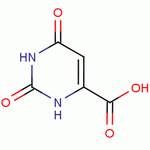Home > Offer to Sell > Intermediates > Pharmaceutical intermediates > Orotic acid CAS 65-86-1 Pyrimidinecarboxylic Acid (jerryzhang001@chembj.com)
Orotic acid CAS 65-86-1 Pyrimidinecarboxylic Acid (jerryzhang001@chembj.com)
Inquiry
| Post Date: | Mar 24,2017 |
| Expiry Date: | Mar 24,2018 |
| Detailed Description: |
Cas No. :65-86-1
Orotic acid CAS 65-86-1 Pyrimidinecarboxylic Acid
Product Name: Orotic acid; Synonyms: 1,2,3,6-tetrahydro-2,6-dioxo-4-pyrimidecarboxylicacid[qr];1,2,3,6-tetrahydro-2,6-dioxo-4-pyrimidinecarboxylicaci;2,6-Dihydroxy-4-pyrimidinecarboxylic acid;4-Pyrimidinecarboxylic acid, 1,2,3,6-tetrahydro-2,6-dioxo-;4-pyrimidinecarboxylicacid,1,2,3,6-tetrahydro-2,6-dioxo-[qr];6-carboxyuracil[qr];acideorotique(french)[qr];acidoorotico; CAS: 65-86-1; MF: C5H4N2O4; MW: 156.1; EINECS: 200-619-8; Product Categories: Vitamin Ingredients;Daily-use cosmetics and medicine nucleic acid biological research;Inhibitors;pharmaceutical; Melting point: >300°C; Water Solubility: Slightly soluble; Chemical Properties: It appears as white crystalline powder with the melting point being 345-346 ℃ (decomposition). Description: 1. Orotic acid is useful in delineating the cause of hyperammonemia.Excessive amounts of orotic acid are usually found in OTC (ornithine transcarbamylase) deficiency, citrullinemia, and often in argininosuccinic aciduria. 2. Orotic acid is a heterocyclic compound and an acid. It was once believed to be part of the vitamin B complex and was called vitamin B13, but it is now known that it is not a vitamin but is instead manufactured in the body by intestinal flora. Its salts, known as orotates, are sometimes used as mineral carriers in some dietary supplements, to increase their bioavailability. 3. It is an intermediate in de novo pyrimidine biosynthesis that may be used to study the specificity and kinetics of orotate phosphoribosyltransferase (OPRT) which catalyzes the reversible phosphoribosyl transfer from 5′-phospho-α-d-ribose 1′-diphosphate (PRPP) to orotic acid, forming pyrophosphate and orotidine 5′-monophosphate (OMP). It may be used to study dependent cell signaling pathways and transcription regulation mechanisms that induce hepatic lipogenesis. Usage: It belongs to vitamin medicines. It is suitable for the treatment of hyperuricemia, hypercholesterolemia, chronic hepatitis and cirrhosis of the liver. It can also be used as anti-anemia drug and nutritional roborant. Large doses can induce fatty liver. Patents of acute-phase hepatitis, leukemia and cancer should be hanged. |
| CAS Registry Number: | 65-86-1 |
| Synonyms: | ;orotic acid anhydrous;orotic acid free acid anhydrous plant*cell cultur;1,2,3,6-tetrahydro-2,6-dioxopyrimidine-4-carboxylic acid;2,6-Dioxo-1,2,3,6-tetrahydropyrimidine-4-carboxylic acid~Uracil-4-carboxylic acid; |
| Molecular Formula: | C5H4N2O4 |
| Molecular Weight: | 156.1 |
| Molecular Structure: | 
|
| Hazard Symbols: |  Xn:Harmful; Xn:Harmful; |
| Risk Codes: | R22:; R36/37/38:; |
| Safety Description: | S22:; S26:; S36/37/39:; |
| Company: | Nanjing Bangnuo Biotechnology Co., Ltd. [ China ] |
| Contact: | Jerry Zhang |
| Tel: | 86-25-52198306 |
| Fax: | 86-25-52198306 |
| Email: | jerryzhang001@chembj.com |
-
Disclaimer statement:The information and data included above have been realized by the enterprises and compiled by the staff, and are subject to change without notice to you. The Chemnet makes no warranties or representations whatsoever regarding the facticity, accuracy and validity of such information and data. In order to ensure your interest, we suggest you chose the products posted by our gold suppliers or VIP members.


